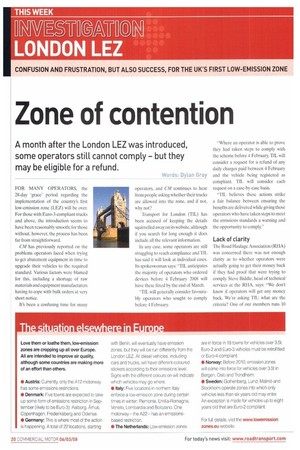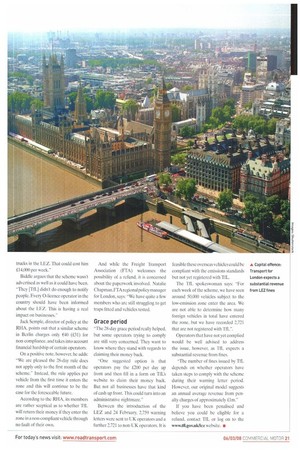Zone of contention
Page 20

Page 21

If you've noticed an error in this article please click here to report it so we can fix it.
A month after the London LEZ was introduced, some operators still cannot comply but they may be eligible for a refund.
Words: Dylan Gray
FOR MANY OPERATORS, the 28-day 'grace' period regarding the implementation of the country's first low-emission zone (LEZ) will be over. For those with Euro-3-compliant trucks and above, the introduction seems to have been reasonably smooth; for those without, however, the process has been far from straightforward.
CM has previously reported on the problems operators faced when trying to get abatement equipment in time to upgrade their vehicles to the required standard. Various factors were blamed for this, including a shortage of raw materials and equipment manufacturers having to cope with bulk orders at very short notice.
It's been a confusing time for many operators, and CM continues to hear from people asking whether their trucks are allowed into the zone, and if not, why not?
Transport for London (TfL) has been accused of keeping the details squirreled away on its website, although if you search for long enough it does include all the relevant information.
In any case, some operators are still struggling to reach compliance and TfL has said it will look at individual cases. Its spokeswoman says: "TfL anticipates the majority of operators who ordered devices before 4 February 2008 will have these fitted by the end of March.
"TfL will generally consider favourably operators who sought to comply before 4 February. "Where an operator is able to prove they had taken steps to comply with the scheme before 4 Febniary, TfL will consider a request for a refund of any daily charges paid between 4 February and the vehicle being registered as compliant. TfL will consider each request on a case-by-case basis.
"TfL believes these actions strike a fair balance between ensuring the benefits are delivered while giving those operators who have taken steps to meet the emissions standards a warning and the opportunity to comply."
Lack of clarity
The Road Haulage Association (RHA) was concerned there was not enough clarity as to whether operators were actually going to get their money back if they had proof that were trying to comply. Steve Biddle. head of technical services at the RHA, says: "We don't know if operators will get any money back. We're asking TfL: what are the criteria? One of our members runs 10
trucks in the LEZ. That could cost him £14,000 per week."
Biddle argues that the scheme wasn't advertised as well as it could have been. "They [TfL] didn't do enough to notify people. Every 0-licence operator in the country should have been informed about the LEZ. This is having a real impact on businesses."
Jack Semple, director of policy at the RHA. points out that a similar scheme in Berlin charges only €40 (E31) for non-compliance, and takes into account financial hardship of certain operators.
On a positive note, however, he adds: "We are pleased the 28-day rule does not apply only to the first month of the scheme." Instead, the rule applies per vehicle from the first time it enters the zone and this will continue to be the case for the foreseeable future.
According to the RHA, its members are rather sceptical as to whether TfL will return their money if they enter the zone in a non-compliant vehicle through no fault of their own. And while the Freight Transport Association (ETA) welcomes the possibility of a refund, it is concerned about the paperwork involved. Natalie Chapman, ETA regional policy manager for London, says: "We have quite a few members who are still struggling to get traps fitted and vehicles tested.
Grace period "The 28-day grace period really helped, but some operators trying to comply are still very concerned. They want to know where they stand with regards to claiming their money back.
-One suggested option is that operators pay the £200 per day up front and then fill in a form on TfL's website to claim their money back. But not all businesses have that kind of cash up front. This could turn into an administrative nightmare."
Between the introduction of the LEZ and 24 February, 2,759 warning letters were sent to UK operators and a further 2,721 to non-UK operators. It is feasible these overseas vehicles could be compliant with the emissions standards hut not yet registered with TfL.
The TfL spokeswoman says: "For each week of the scheme, we have seen around 50,000 vehicles subject to the low-emission zone enter the area. We are not able to determine how many foreign vehicles in total have entered the zone, hut we have recorded 2,721 that are not registered with TfL".
Operators that have not yet complied would be well advised to address the issue, however, as TfL expects a substantial revenue from fines.
"The number of fines issued by TfL depends on whether operators have taken steps to comply with the scheme during their warning letter period. However, our original model suggests an annual average revenue from penalty charges of approximately Elm."
If you have been penalised and believe you could be eligible for a refund, contact TIL or log on to the www.tfl.gov.uk/lez website. •












































































































































































